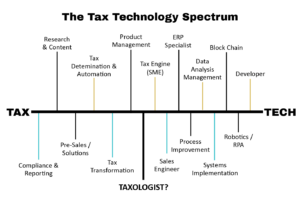Harvey John
Unit 2 Ferry Wharf
Hove Enterprise Centre
Basin Road North
Portslade, East Sussex
BN41 1BD
Tax Technology Professionals are always in demand.
Explaining the role of a tax technology professional, as well as how you can move into this type of career, isn’t always easy. And it’s a question we’re asked often!
How can I develop a successful career in tax technology? Ultimately, the difficulty in answering this question comes down to how expansive the tax technology landscape is while still being on the peripherals of the broader tax market.
Both sentiments here are true: only a small percentage of the tax population operate in a technology oriented role yet the breadth of demands and opportunities within the tax technology space are huge (and continue to grow).
The ‘Tax Technology Spectrum’
With the HJ tax team speaking to thousands of tax professionals every year – many of whom possess different skill sets – it’s very difficult to give a cookie-cutter answer to all those who ask us: ‘How can I move into tax technology?’
Over the years, however, the simplest way of explaining this evolving market is to refer to what I call the ‘Tax Technology Spectrum’ (some of you will be nodding to this while remembering previous conversations we’ve had!). Indeed, I should note that this by no means captures the true depth of taxology but it will give you an idea of what we are facing in recruitment.
What is the tax technology spectrum? Well, imagine that on one side we have ‘tax’ and, on the other, we have ‘technology’ on the other.
Nestled between the ‘tax’ and ‘technology’ core disciplines, we have the world of tax technology. And within this world, we have a variety of job roles across the spectrum.
Here, you can assume that this whole left-of-centre space reflects the roles and responsibilities that constitute a ‘tax technology’ role but from a deeper tax technical engagement.
Subsequently, on the alternative side we have the representation of technology / IT. Here, all that is plotted right-of-centre reflects the tax technology professionals who operate in a more IT heavy capacity.
Ultimately, where one sits in this spectrum is dependent on how much ‘tax’ and how much ‘tech’ focused work they’re involved in.
A closer look at the ‘Tax Technology Spectrum’
We have is a spectrum that is a product of its environment. The disruptive nature of technology and its ability to rapidly evolve will endlessly change the priorities of end-users and so, as the demand for technology in tax evolves and users fluctuate between different systems or practices, the spectrum will inevitably stretch.
From a recruitment perspective, there will always be those core job roles on the spectrum. However, as tax technology becomes more sophisticated, I suspect we’ll be adding new positions into the mix on an annual basis.
Here’s a sketch on what we think the tax technology spectrum looks like in 2021:

How can I become a tax technology professional?
This is the question everyone is asking, but are we being too simplistic when we refer to a ‘tax technology’ professional? Well, yes and no.
Despite both being tax and technology, clearly the role of systems expert is very different to that of a research & content analyst. And now that we have the tax technology spectrum as a reference point, this is visually obvious.
However, what the spectrum also demonstrates are the assumed entry points to the world of tax technology and how different roles tap into different skill sets. It’s therefore not simply a question of how to become a tax technology professional but rather what is achievable with the tools you have available and what is the type of role you are targeting.
For instance, the roadmap for a traditional tax advisor to become a systems engineer is certainly a stretch. By nature, they’ll likely lack the digital awareness and tech-savviness as well as being hardwired to operate in a completely different capacity than a developer.
However, the prospect of becoming a tax transformation advisor is more achievable. In this case, you’ll inevitably be entering the tax technology spectrum from a pure tax standpoint. To become a viable candidate for this type of role, your roadmap will be to gain exposure to operations and reporting, project management, ERP systems, alternative tax engines, data processes and then finally understand how these components play a role in a successful in-house tax function.
Indeed, this is only one example of a tax professional who wishes to enter the digital world of tax, but the same process can be applied to whatever your current position is. Ultimately, you must make an assessment of your skills and experience:
- What skills and experience do you currently possess?
- What skills do you need to learn?
- How can you learn these skills?
- Where can you gain this experience?
Concluding thoughts
In my opinion, there’s never been a more exciting time to be a tax professional than there is now.
With the onset of new technologies and processes coming onto the scene almost every year, the employment market right now is one of both breadth and depth. No longer can the tax occupation be split between working in professional services versus in-house – there’s now far much more to this.
Indeed, the insights we’ve shared here really emphasise the importance of re-addressing your skills. In an industry that is constantly battling with change, this is imperative. Beyond this, however, it’s worth stressing that the practical application of skills can only go so far when not supplemented by principles, vision, and theory.
And this is where we broach the much broader topic of whether today’s tax education is fit for purpose in a digitally progressive industry. We will attempt to tackle this issue in our next instalment.
—
Alex Mann is Associate Director, Indirect Tax & Tax Technology at Harvey John
For expert advice on how to get the best out of your tax career, whether in a professional services firm or in-house, contact us today.
Harvey John is a specialist Accountancy, Tax & Treasury, and Legal recruiter operating across the UK & EMEA market
Author

From boutiques to the Big 4, and start-ups to multinational corporations, Alex manages a diverse portfolio of clients worldwide which has enabled him to develop a vast global network of indirect tax and tax technology professionals in 40+ countries.

